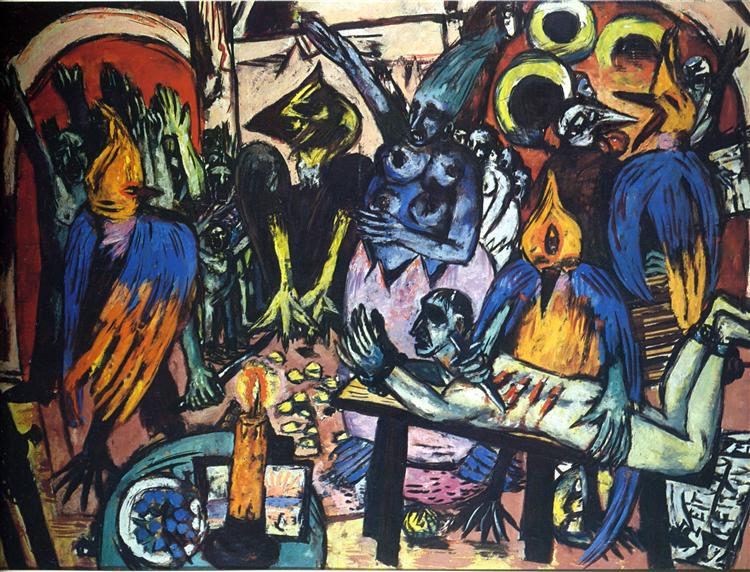Description
In "The hell of birds" (1938), Max Beckmann enters into a universe of intense and distressing visual narrative symbolism, reflecting the tensions and restlessness of his time. This work, which is part of the legacy of an artist who lived in the turbulence of the first half of the twentieth century, evokes a feeling of chaos and nightmare, sly capture the complexity of human existence.
The viewer is immersed in a dense composition, where figures that seem trapped in a game of shadows and lights are displayed. Although at first glance they may seem mere decorative elements, they have become protagonists of a story that addresses the human condition and suffering. Birds, omnipresent in the work, acquire a deep meaning; Its intense color and its shape in flight can be interpreted as symbols of the desire for freedom, as opposed to the prison that represents the oppressive atmosphere of the "hell" that Beckmann presents.
The color palette in "The hell of birds" is particularly shocking. With a predominant use of dark and off tones, accentuated by vibrant touches, Beckmann manages to create a sensation of emotional dissonance. Critics have pointed out how these visual contrasts respond to a duality of human nature; The struggle between hopelessness and the search for transcendence. The birds are represented with a technique that suggests a frantic movement, implying a sense of agony that is in the narrative of many of Beckmann's works.
The characters in the work, although often indistinguishable and inaccurate, seem to represent archetypes of human suffering. Faces and figures seem to be in tension, transmitting emotions that range from hopelessness to rage, immortalizing a moment of personal and collective crisis. This gloomy representation of humanity is a distinctive seal of Beckmann, an artist who sought deep revelations about life through his art.
Max Beckmann is known for having developed a style that aligns with expressionism, but its particular approach towards the distortion of the form, narrative and color psychology distinguishes it within this movement. Beckmann's works are characterized by intense dimensionality, both physical and emotional, turning each painting in a scenario in which the spectator becomes involuntary participant of the representation. "The hell of birds" is no exception, offering a universe where anguish and splendor are intertwined in a disturbing way.
Through his works, Beckmann also reflects on the impact of the historical context on the individual. "The hell of the birds" was created shortly before World War II, a time in which Europe was on the edge of the catastrophe. This work can be seen as a precursor to despair that would intensify in the following decades. The birds, often considered symbols of freedom, are portrayed here in an environment that suggests paralysis and hopelessness, an echo of the ethos of a time where the absurd and the tragic were intertwined.
Beckmann's painting continues to resonate with audacity today, reminding us that even in the representation of suffering, there is a power to be present, reflect and question the human condition. "The hell of birds" is not only a visual work of great technical and emotional depth, but also becomes a testimony of the ability of art to explore the most raw and complex experiences of existence. In his work, Beckmann not only documes what he sees; He invites us to see beyond, to contemplate our place in a world that we are often alien, letting the experience transform us.
KUADROS ©, a famous paint on your wall.
Hand-made oil painting reproductions, with the quality of professional artists and the distinctive seal of KUADROS ©.
Art reproduction service with satisfaction guarantee. If you are not completely satisfied with the replica of your painting, we refund your money 100%.

